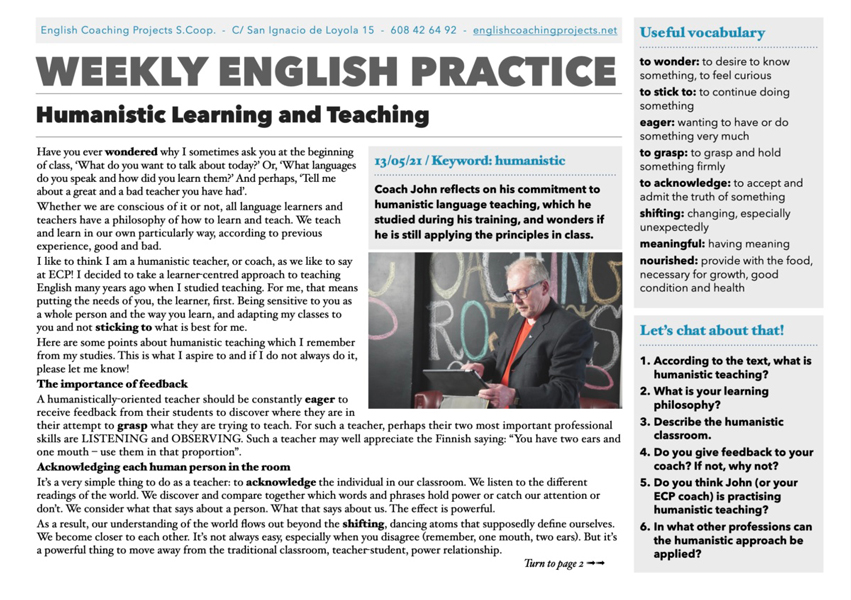Humanistic Learning and Teaching
13/05/21 / Keyword: humanistic
Coach John reflects on his commitment to humanistic language teaching, which he studied during his training, and wonders if he is still applying the principles in class.
Click HERE to download the Weekly English Practice as a PDF.
Useful vocabulary
to wonder: to desire to know something, to feel curious
to stick to: to continue doing something
eager: wanting to have or do something very much
to grasp: to grasp and hold something firmly
to acknowledge: to accept and admit the truth of something
shifting: changing, especially unexpectedly
meaningful: having meaning
nourished: provide with the food, necessary for growth, good condition and health
Listen to the audio and read the text (refresh the page if it’s not visible).
Coach John reflects on his commitment to humanistic language teaching, which he studied during his training, and wonders if he is still applying the principles in class.
Have you ever wondered why I sometimes ask you at the beginning of class, ‘What do you want to talk about today?’ Or, ‘What languages do you speak and how did you learn them?’ And perhaps, ‘Tell me about a great and a bad teacher you have had’.
Whether we are conscious of it or not, all language learners and teachers have a philosophy of how to learn and teach. We teach and learn in our own particularly way, according to previous experience, good and bad.
I like to think I am a humanistic teacher, or coach, as we like to say at ECP! I decided to take a learner-centred approach to teaching English many years ago when I studied teaching. For me, that means putting the needs of you, the learner, first. Being sensitive to you as a whole person and the way you learn, and adapting my classes to you and not sticking to what is best for me.
Here are some points about humanistic teaching which I remember from my studies. This is what I aspire to and if I do not always do it, please let me know!
The importance of feedback
A humanistically-oriented teacher should be constantly eager to receive feedback from their students to discover where they are in their attempt to grasp what they are trying to teach. For such a teacher, perhaps their two most important professional skills are LISTENING and OBSERVING. Such a teacher may well appreciate the Finnish saying: “You have two ears and one mouth – use them in that proportion”.
Acknowledging each human person in the room
It’s a very simple thing to do as a teacher: to acknowledge the individual in our classroom. We listen to the different readings of the world. We discover and compare together which words and phrases hold power or catch our attention or don’t. We consider what that says about a person. What that says about us. The effect is powerful.
As a result, our understanding of the world flows out beyond the shifting, dancing atoms that supposedly define ourselves. We become closer to each other. It’s not always easy, especially when you disagree (remember, one mouth, two ears). But it’s a powerful thing to move away from the traditional classroom, teacher-student, power relationship.
In a humanistic classroom
- Students’ learning should be self-directed.
- Students should want to know how to learn.
- The only form of meaningful evaluation is self-evaluation.
- Feelings, as well as knowledge, are important in the learning process.
- Students learn best in a nonthreatening environment.
My job is to create an atmosphere of trust in class, where your curiosity and natural desire to learn is nourished. A place where you are able to recognise your progress and hopefully develop a love of language learning which leads you to become a lifelong learner.
Written by ECP coach John – remembered from his Master in TEFL degree, University of Jaén.
By the way, I ask you questions about your learning experiences and seek your opinions because I still want to learn about learning too and I am genuinely interested in your opinions. That is the humanistic approach!
Let’s chat about humanistic learning!
- According to the text, what is humanistic teaching?
- What is your learning philosophy?
- Describe the humanistic classroom.
- Do you give feedback to your coach? If not, why not?
- Do you think John (or your ECP coach) is practising humanistic teaching?
- In what other professions can the humanistic approach be applied?
Take a moment to look at these related articles!
Racing Horses And Learning English

